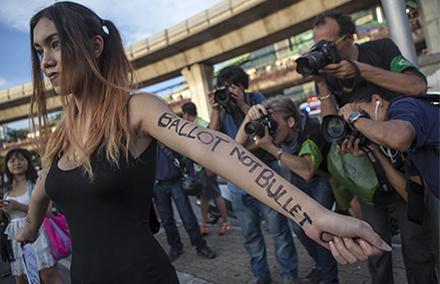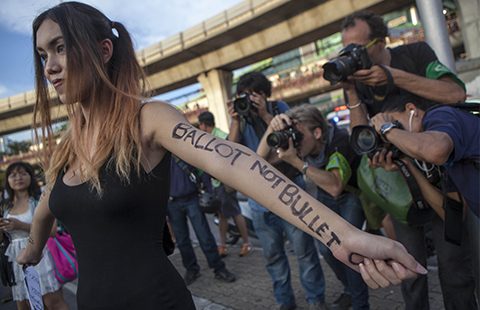
An anti-coup protestor demonstrates in Bangkok on 24 May, 2014. Photo by AFP.
To heal current political wounds should Thailand wait five years for free and fair elections?
On any given day, if you are driving between Bangkok and the suburbs, you are likely to encounter traffic jams in the most unusual of places. Most often than not, it will be the police controlling the traffic.
Thai police have the tendency to alternatively block one side of the road to let the traffic flow faster for a while and vice versa. But any traffic engineer will tell you that it is continual flow which is more important, whether fast or slow. Selectively switching the flow on or off actually induces a traffic jam.
This is typical of Thailand.
The country is once again stuck now that a military coup has led to traffic flow for one side of politics, but jammed progress for the rest of the country.
After the coup, one side believed that there would be uprising and democracy would be restored. The other side believed that the economy would roar back and the flow of money to peoples’ pockets would silence any opposition.
But both have not happened.
To make matters worse, the current myriad of actors have no credibility and whatever they achieve will hardly be accepted by their own supporters, let alone the masses.
In the case of both stark choices the country now faces – continuous military rule or elections and the formation of a new government – the outcome is also highly uncertain.
Thailand is in a typically switched off mode. For its citizens, facing so much uncertainty, not knowing if any immediate outcome will solve such an intractable problem, it is easy to enter this phase.
Thais are aware of what they have been deprived of by both this and previous governments. But in a situation so confusing, when one doesn’t know who is their friend and who is their enemy, people withdraw. This is the most dangerous situation a country can descend into.
People don’t just withdraw from politics but economic activities as well. The reason why the Thai economy has stalled is because of this.
An example is neighbouring Myanmar, which stagnated for 50 years. It is only starting to catch up to its past levels of economic development today. Remember, in the 1950s, Myanmar was considered to be the rising star of Asia.
Countries do not become underdeveloped overnight. It is a process which happens slowly when growth stalls for one country while others move forward. Thailand started stalling intermittently in 2005 and is now in full blown decay. The effect is apparent in many spheres.
Physical infrastructure is slowly deteriorating, the education system in tatters, and the economy is uncompetitive and is therefore trying to force down wages. The country also faces a huge ageing problem including an ageing workforce.
Most of these require urgent action and attention, but as the country is not able to come together politically it is suffering economically. Parties which are fighting now will be left with a crippled country. It is like parents fighting over a child and not feeding it, to only later realise that whoever has won is left with a lifeless child.
I don’t want to point fingers. Most of the long-term problems crept into the country long ago and political troubles have only caused crippling inaction. But the question remains; how can Thailand get out of this quagmire? What can trigger progress?
First let us accept that the basic problem is political. Political problems are solved either by confrontation, where one side is often annihilated, or by compromise. As confrontation has resulted in the current untenable situation, it seems to me that compromise is essential.
Who will be the architects of this compromise? We always hear about some backroom dialogue between Thaksin and the elites, but will any agreement between them work in the larger context? Thailand has moved beyond factions and beyond rallies; people have their own ideas and they should be respected.
I think there are some vital steps needed to take the country out of this current mess. There should be grand bargain between current rulers and the people. All current reforms, including the drafting of a new constitution should be disbanded. Instead, the 1997 constitution should be adopted.
The interim administration led by General Prayuth Chan-ocha should only be made up of technocrats and run by decree. These technocrats should be neutral or be chosen by each side. In order to modernise, the country needs to change key systems, including education and the judiciary. Thailand should also improve its criminal justice. And, we must reduce the influence of religious institutions in public life.
Finally, Thailand must aim for a sustainable democratic system within five years. This is because it is not just democracy but the long-term health of the country that is at stake.
After five years Thailand must hold free and fair elections, giving the elected legislature the option to nullify/modify any decree within a year, or else it becomes law. In addition, constitutional change should only be allowed with a two-thirds majority of votes form the lower house and senate.
It may seem distasteful for any liberal commentator to consider not having elections and continuing with an administration led by a prime minister ruling by decree for the next five years. I fully agree with this sentiment.
However, Thailand today is not only stuck in traffic; it is a wounded runner. One side is prodding the country to run while the other side wants to amputate the leg to get rid of the injury.
As hard as it may be, the solution is to let the wound heal.
Sarawut Metharom is a pseudonym. The author is a long-time resident of Thailand.
 Facebook
Facebook  Twitter
Twitter  Soundcloud
Soundcloud  Youtube
Youtube  Rss
Rss 